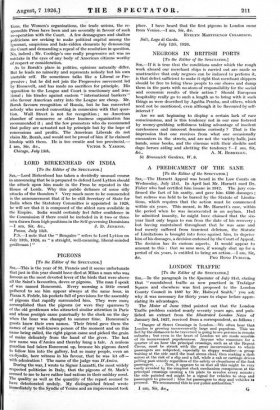PIGEONS
[To the Editor of the SPECTATOR.]
SIR,—This is the year of St. Francis and it seems unfortunate that just in this year should have died at Milan a man who was famous as the most devoted lover of the birds that were above all the Saint's favourites, doves or pigeons. The man I speak of was named Roncoroni. Every morning a little crowd gathered to see him appear always at the same hour, in Piazza S. Fedele, his pockets full of provisions for the assembly of pigeons that rapidly surrounded him. They were more accomplished than the pigeons (or were they sparrows 7) of the old gentleman who attracted similar attention in Paris and whose proteges came punctually to the clock on the day when the hour was changed to summer time. Roneoroni's guests knew their own names. Their friend gave them the names of any well-known person of the moment and on this name being called, the right pigeon came and picked the grain of maize delicately from the hand of the giver. The last new name was d'Amico and thereby hung a tale. A zealous guardian had taken Roncoroni up, because his pigeons dared to follow him into the gallery, but so many people, even an ex-Syndic, bore witness in his favour, that he was let off— with admiration ! The name of the judge was D'Amico. During the war, I wrote to Signor Luzzatti, the most widely respected politician in Italy, that the pigeons of St. Mark's seemed to me to have rather bad rations in their midday meal. The quality as well as the quantity of the repast seemed to have deteriorated unduly. My distinguished friend wrote immediately to the Syndic of Venice and an iMprovement took
place. I have heard that the first pigeons in London came from Venice.—I am, Sir, &e.
EVELYN MARTINENGO CESARESCO.
Salk Lago di Garda.
July 12th, 1926.






































 Previous page
Previous page